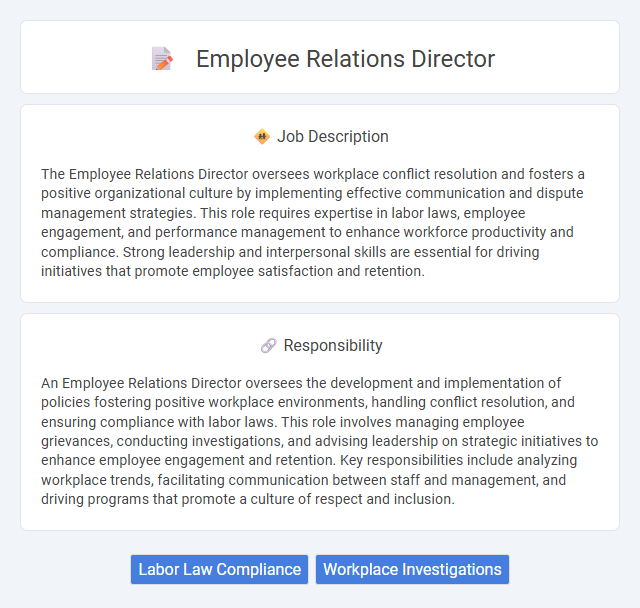
The Employee Relations Director oversees workplace conflict resolution and fosters a positive organizational culture by implementing effective communication and dispute management strategies. This role requires expertise in labor laws, employee engagement, and performance management to enhance workforce productivity and compliance. Strong leadership and interpersonal skills are essential for driving initiatives that promote employee satisfaction and retention.
Individuals with strong interpersonal skills and a keen understanding of workplace dynamics are likely to be well-suited for the role of Employee Relations Director. Candidates who thrive in conflict resolution and demonstrate empathy toward employee concerns may find this position aligns with their strengths. Those uncomfortable with managing sensitive issues or high-pressure environments might face challenges in fulfilling the demands of the job effectively.
Qualification
An Employee Relations Director typically requires a bachelor's degree in human resources, business administration, or a related field, with many employers preferring a master's degree or HR certification such as SHRM-SCP or SPHR. Extensive experience, often 7-10 years, in employee relations, conflict resolution, labor laws, and organizational development is essential for managing workplace dynamics and ensuring compliance. Strong leadership, communication, and negotiation skills are critical for developing effective employee relations strategies and fostering a positive work environment.
Responsibility
An Employee Relations Director oversees the development and implementation of policies fostering positive workplace environments, handling conflict resolution, and ensuring compliance with labor laws. This role involves managing employee grievances, conducting investigations, and advising leadership on strategic initiatives to enhance employee engagement and retention. Key responsibilities include analyzing workplace trends, facilitating communication between staff and management, and driving programs that promote a culture of respect and inclusion.
Benefit
Employee Relations Directors are likely to receive competitive benefits packages that typically include comprehensive health insurance, retirement plans, and performance-based bonuses. They might also have access to professional development opportunities, which can enhance career growth and job satisfaction. These benefits could contribute to improved employee retention and workplace morale within the organization.
Challenge
The challenge of an Employee Relations Director job likely involves navigating complex workplace conflicts and balancing diverse employee needs with organizational goals. Managing legal compliance and fostering a positive culture may require strategic problem-solving and effective communication skills. This role probably demands resilience and adaptability to address evolving workforce dynamics and regulatory changes.
Career Advancement
The Employee Relations Director role offers significant career advancement opportunities through leadership in conflict resolution, policy development, and strategic workforce planning. Mastery of labor laws, employee engagement, and organizational culture enhances promotion potential to senior human resource executive positions. Strong communication and negotiation skills are critical for driving positive workplace environments and advancing to roles such as Chief Human Resources Officer (CHRO).
Key Terms
Labor Law Compliance
Employee Relations Directors oversee Labor Law Compliance by ensuring organizational policies align with federal, state, and local employment regulations such as the Fair Labor Standards Act (FLSA) and the National Labor Relations Act (NLRA). They lead investigations into workplace disputes and implement corrective actions to mitigate risks related to labor violations, fostering a compliant and fair work environment. Expertise in collective bargaining agreements, employee rights, and OSHA standards is critical for maintaining legal compliance and supporting workforce stability.
Workplace Investigations
An Employee Relations Director specializing in workplace investigations leads the identification, analysis, and resolution of employee grievances and misconduct, ensuring compliance with labor laws and company policies. They design and implement thorough investigation protocols, collect and evaluate evidence, and recommend appropriate corrective actions to maintain a fair and respectful workplace environment. Expertise in conflict resolution, legal standards, and confidential reporting systems is crucial for mitigating risks and fostering positive employee relations.
 kuljobs.com
kuljobs.com